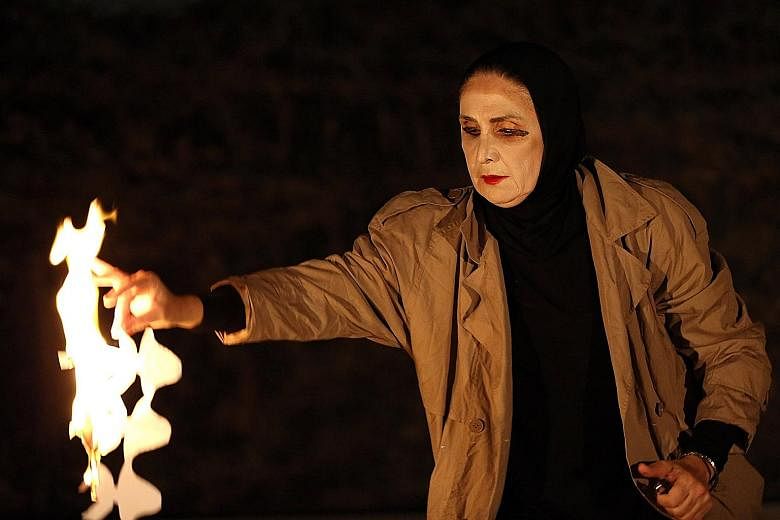REVIEW / THEATRE
JOGGING: THEATRE IN PROGRESS
M1 Singapore Fringe Festival
Esplanade Theatre Studio/Wednesday
What Hanane Hajj Ali talks about when she talks about running ranges from the transcendental to the disturbing.
She talks about God. She talks about sex - dream sex, bad sex, bad dream sex. She talks about what it must be like to kill your children.
Grim stuff, to be sure. And yet, this one-woman show by Hanane, a Lebanese actress in her 50s, is also slyly funny.
Directed by Eric Deniaud and performed chiefly in Arabic, it follows Hanane as she jogs around Beirut daily to stave off osteoporosis, obesity and depression.
Along the way, it wanders through the landscape of womanhood in Lebanon, a country where female citizens cannot pass their nationality on to their children.
Clad in black running gear, Hanane makes a spectacle of her exercise - huffing and puffing, contorting herself into comical warm-up poses - which belies the fact that she is dexterous.
At one point, she delivers her lines while moving heels over head into a yoga pose with nary a hitch in breath.
She often calls upon the audience, asking them to read out introductions between scenes, teasing male audience members and, at one point, handing out fruit salad to the front row.
An obsession with the figure of Medea from Greek myth runs throughout the piece.
Medea, as satirically recounted by Hanane, was a princess and sorceress who betrayed her father and killed her brother to gain the love of the hero Jason, only for him to later abandon her. In revenge, she killed their two children.
Hanane struggles to understand how a mother could do such a deed, yet she reveals that she has dreamt of smothering her seven-year-old son when he had cancer, to spare him more suffering.
She slips adroitly into the stories of two modern-day Medeas: Yvonne, who poisons her three daughters and herself with fruit salad (the same kind Hanane serves to the audience); and Zahra, a militant's wife who responds to her husband's adultery by asking God to make her sons martyrs.
Shifting between the scabrous and the sepulchral, Hanane proves herself to be an actress at the top of her game.


